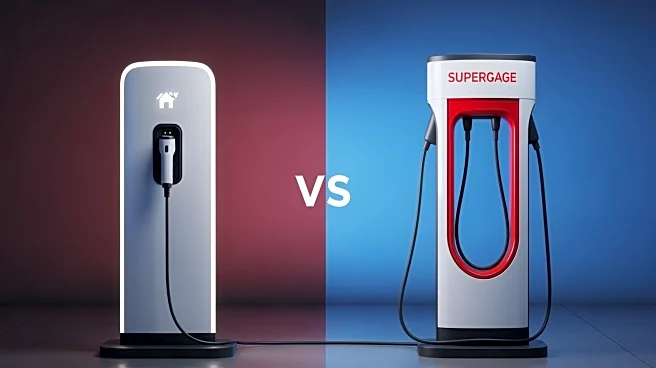What's Happening?
A recent discussion among Tesla owners has brought to light the significant cost differences between charging electric vehicles at home versus using Tesla's Supercharger network. According to a Tesla Model 3 owner, charging at home costs approximately
$0.15 per kWh, resulting in a full charge cost of $12.30. In contrast, using a Supercharger in the same area costs $0.35 per kWh, with a full charge amounting to $28.70. This disparity highlights the financial benefits of home charging, despite the convenience and speed offered by Superchargers. The discussion also revealed that over extended periods, such as 50,000 miles or six years, Tesla owners have saved substantial amounts compared to traditional gasoline vehicles, with one owner reporting savings of at least $20,000.
Why It's Important?
The cost differences between home charging and Supercharging are crucial for current and prospective electric vehicle owners to consider. While Superchargers offer rapid charging, the higher costs can accumulate over time, impacting the overall cost-effectiveness of owning an electric vehicle. This information is particularly relevant as the U.S. electric vehicle market faces challenges such as high prices and charging infrastructure concerns. Understanding these cost dynamics can influence consumer decisions, potentially driving more investments in home charging solutions and affecting the adoption rate of electric vehicles. Additionally, the significant savings reported by long-term Tesla owners underscore the economic advantages of electric vehicles over traditional gasoline cars, which could further encourage the shift towards sustainable transportation.
What's Next?
As the electric vehicle market continues to evolve, it is likely that more consumers will weigh the benefits of home charging against the convenience of Superchargers. This could lead to increased demand for residential charging infrastructure and potentially influence Tesla and other manufacturers to explore ways to reduce Supercharging costs. Additionally, as more data becomes available, consumers will be better equipped to make informed decisions about their charging options, potentially impacting the broader market dynamics and the future of electric vehicle adoption.
Beyond the Headlines
The discussion around charging costs also touches on broader themes of energy consumption and sustainability. As electric vehicles become more prevalent, the demand for electricity will increase, raising questions about the sources of this energy and its environmental impact. The push for more affordable and accessible home charging solutions could drive innovation in renewable energy technologies and smart grid systems, contributing to a more sustainable energy future.

















